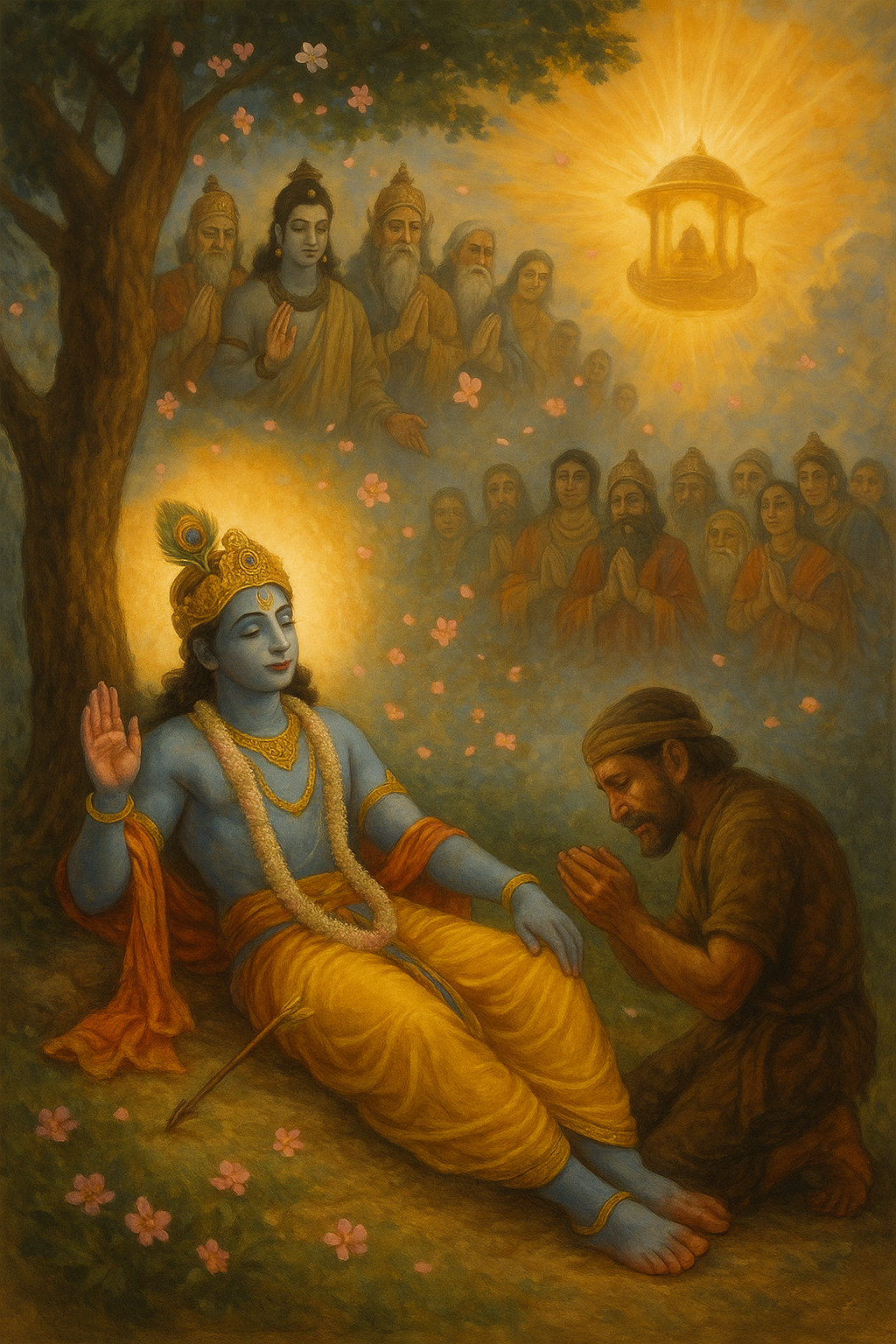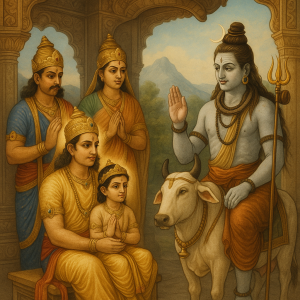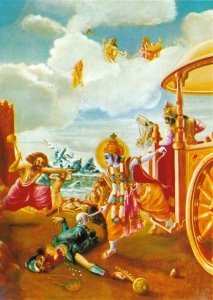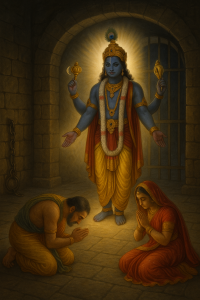The Burden of the Earth is Lifted
After the great war of Kurukṣetra, the Earth, once overwhelmed by the burden of adharma, now began to breathe again. Kings who were like demons had been vanquished, dharma had been restored, and the Lord’s divine purpose was fulfilled.
Kṛṣṇa, the Supreme Personality of Godhead, had come to Earth not only to assist the Pāṇḍavas, protect devotees, and destroy the wicked, but also to reveal His sweetness, His friendship, and His eternal pastimes.
Now, His time to depart had arrived, a moment known to the devas, sages, and even the Earth herself.
The Departure from Dvārakā
The signs became clear. Calamities stirred, rivers dried, and the oceans surged. The Yādava dynasty, once glorious and blessed, was now caught in a strange fate—internal conflict and curses, the unfolding of destiny itself.
Lord Kṛṣṇa, seeing that His mission was complete, prepared to withdraw His divine form from the vision of the world.
But before leaving, He visited each of His queens, embraced His sons, and offered words of comfort and eternal assurance:
“My form may vanish, but I remain forever in the hearts of those who remember Me.”
He walked silently toward the forest near the Prabhāsa region, where the final chapter of His Earthly pastimes would unfold.
The Arrow and the Lord’s Acceptance
As He sat under a tree, dressed in yellow silk, the forest breeze playing with His hair, a hunter named Jarā approached, mistaking the Lord’s foot for the snout of a deer.
Jarā released his arrow.
The arrow pierced Kṛṣṇa’s foot—a symbolic gesture, for no weapon could harm the Lord unless He allowed it. It was His divine will, not fate, that set the scene.
Jarā rushed to the Lord in horror and sorrow, falling at His feet.
Kṛṣṇa smiled gently:
“Do not fear. This was destined. You are only an instrument.”
He forgave Jarā and granted him liberation.
The Arrival of the Devas and Celestial Welcome
As Kṛṣṇa lay upon the sacred earth, celestial sounds filled the air. The devas, led by Brahmā, Śiva, Indra, and Nārada, arrived, showering flowers and singing hymns.
They praised:
“O Kṛṣṇa, O eternal Supreme Being! You descend for the sake of the world, and now You return to Your abode beyond the three worlds.”
The earth wept, the sky turned golden, and a divine chariot, unseen by human eyes, arrived from Vaikuṇṭha.
In that moment, Kṛṣṇa’s transcendental form rose, surrounded by light, beyond all sorrow and decay, smiling with compassion upon the Earth.
The Eternal Presence
Though the Lord departed from the mortal plane, He never truly left. His pastimes are eternal, His name is eternal, and His Bhāgavatam is His living presence.
Wherever His stories are told, wherever His name is chanted, Kṛṣṇa remains, dancing in the heart of the devotee.
The sages concluded:
“This world is blessed, for it once held the footprints of Śrī Kṛṣṇa.”
Lessons to Be Learned:
- The Lord’s pastimes on Earth are purposeful, never random or mundane.
- Kṛṣṇa leaves the world not in sorrow, but in divine joy, returning to His eternal abode.
- Even a hunter like Jarā is liberated by a moment of surrender at the Lord’s feet.
- The Supreme Lord controls the time of His birth and death, proving His transcendence.
- Kṛṣṇa’s departure is not an end, but a call to remember Him eternally.
Origin of the Story: Harivamsa Purana 4 – Chapters 17–19: The Withdrawal of Śrī Kṛṣṇa’s Divine Form from Earth and the Witnessing of the Devas



